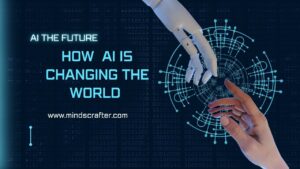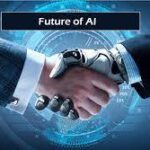
Future of AI
The Future of Artificial Intelligence | Enhancing Human Lives:
Future of AI Technology has already begun to revolutionize how we live and work, and its potential for the future is nothing short of extraordinary. From improving healthcare to driving innovation in the transportation industry, AI is poised to transform countless industries and enhance human lives in countless ways. In this rapidly advancing field, the possibilities seem endless; the only limit is our imagination.
This short article will delve into the world of AI, exploring the technologies that are driving progress and how they’re already transforming the world around us. From its impact on the job market to the ethical implications of its use, it will explore all the key issues and trends shaping the future of AI. So buckle up and prepare for a fascinating journey into the exciting world of artificial intelligence.
Current Applications of Artificial Intelligence:
Countless ways are already utilizing AI to improve our lives and make our world better. AI in healthcare is helping doctors to diagnose diseases and develop personalized treatment plans. For example, IBM’s Watson for Oncology is a powerful tool that analyzes patient data and recommends treatment options based on the latest medical research.
In addition, AI in the transportation industry, is helping to develop self-driving cars and trucks, which have the potential to reduce accidents and increase efficiency on the roads. Companies like Tesla, Uber, and Waymo are already testing autonomous vehicles on public roads, and experts predict that they will become mainstream in the next decade. In addition, companies like Amazon, Google, and Microsoft actively utilize AI to enhance customer service, employing chatbots and virtual assistants, including Alexa, Google Assistant, and Cortana, that provide 24/7 support and answer questions. These assistants actively assist with a wide range of tasks, including ordering groceries and controlling smart home devices.
Benefits of Artificial Intelligence:

Future of Artificial Intelligence Technology
The potential benefits of AI are enormous. By automating repetitive tasks and analyzing vast amounts of data, AI has the potential to increase efficiency, reduce costs, and improve outcomes in countless industries. In healthcare, for example, artificial intelligence can help doctors diagnose diseases more accurately and develop personalized treatment plans tailored to each patient’s unique needs.
In the transportation industry, self-driving cars and trucks have the potential to reduce accidents and save lives while also reducing traffic congestion and improving air quality.
Artificial Intelligence in Customer Service, chatbots and virtual assistants can provide instant customer support around the clock, improving satisfaction and reducing business costs. Moreover, AI also has the potential to create new industries and jobs.
The Future of Artificial Intelligence:
The future of AI is both exciting and uncertain. On the one hand, the potential for AI to transform industries and improve our lives is enormous. On the other hand, there are concerns about the impact of AI on employment and the ethical implications of its use.
One thing is clear: AI will continue to advance rapidly in the coming years, with breakthroughs and applications constantly emerging. Some experts predict that AI will eventually surpass human intelligence, leading to a world where machines are in control. Others believe that AI will be a powerful tool humans can use to improve their lives and solve complex problems.
Whatever the future holds, it’s clear that AI will have a profound impact on our world. As we continue developing and refining this technology, we must actively consider the potential risks and strive to ensure that AI is used for the greater good.
How Artificial Intelligence is Transforming Industries:
AI is already transforming countless industries, from healthcare to finance to retail. Ahealthcare, AI actively contributes to developing more accurate diagnoses and treatment plans, analyzing patient data, and identifying patterns that can lead to better outcomes.
In finance, AI detects fraud, improves risk management, and develops more accurate market trends and consumer behavior predictions. In retail, AI actively personalizes the shopping experience for customers by providing recommendations and tailored promotions based on each individual’s preferences and behaviors.
AI is actively transforming the transportation industry, incorporating self-driving cars and trucks that have the potential to reduce accidents and save lives. Furthermore, AI is being utilized to optimize traffic flow, minimize congestion, and innovate new modes of transportation, such as flying taxis and hyperloop.
The Impact of Artificial Intelligence on Employment:
One of the biggest concerns about AI is its impact on employment. As machines become more intelligent and capable, there are fears that they will take over jobs that humans once performed.
While it’s true that some jobs will be automated in the coming years, it’s also true that AI will create new jobs and industries. As machines take over repetitive and menial tasks, humans will be freed to focus on more creative and complex work. This will create opportunities for new industries and jobs, as well as for developing new skills and abilities.
However, there is no denying that the transition to a world of AI will be difficult for some workers. We must work to mitigate the impact on those who will be most affected through education, training, and support programs.
Ethical Considerations of Artificial Intelligence:
As AI advances and becomes more ubiquitous, ethical concerns arise. One of the primary concerns centers around the potential societal harm caused by AI, including its involvement in developing autonomous weapons and manipulating public opinion.
Furthermore, concerns extend to privacy, security, job market, and the economy. The progression of AI carries the active risk of replacing human workers, potentially resulting in widespread unemployment and economic disruption. Addressing these concerns necessitates active development of ethical guidelines and regulations for AI’s use, ensuring its alignment with the greater good.
Achieving this goal demands collaboration among governments, industry leaders, and experts, alongside ongoing dialogue and debate regarding the optimal utilization of this powerful technology.
Advancements in Artificial Intelligence Research:
The field of AI is advancing rapidly, with breakthroughs and discoveries constantly emerging. One of the most exciting research areas is the development of deep learning algorithms, which allow machines to learn and adapt based on vast amounts of data.
Another area of research is in the development of natural language processing, which allows machines to understand and interpret human language. This has important implications for the development of chatbots and virtual assistants and for the development of intelligent systems that can communicate with humans more naturally and intuitively. Finally, as AI technology continues to advance, there is no doubt that new applications and breakthroughs will emerge. It’s an exciting time to work in this field, and there is no limit to the possibilities for the future.
Conclusion: The Potential of Artificial Intelligence for Enhancing Human Lives
Artificial intelligence is poised to transform the world in countless ways, from improving healthcare to revolutionizing transportation. Its potential for enhancing human lives is enormous, and the possibilities for the future are endless.
However, there are also concerns about the impact of AI on employment and the ethical implications of its use. We must work to mitigate these risks and ensure that AI is used for the greater good. Finally, AI is already changing the game. Thus, careful planning and collaboration, we can actively ensure that AI enhances human lives and actively solves some of the world’s most pressing problems.

Pingback: 21 Lessons for the 21st Century